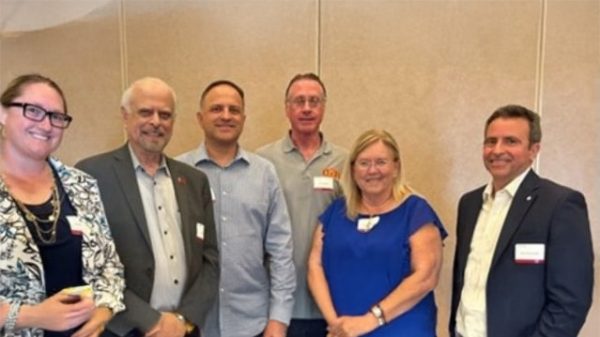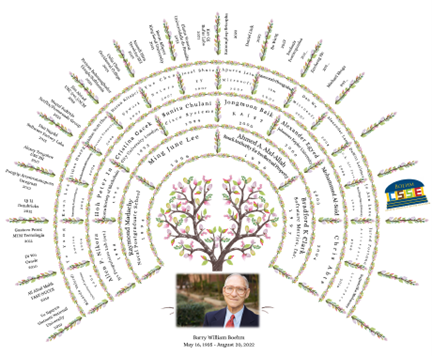Community Honors Dr. Barry Boehm with Memorial Symposium

Dr. Barry Boehm is a legend in the systems and software engineering communities. On Thursday, September 14, 2023, Barry was honored by both communities coming together at the Dr. Barry Boehm Memorial Symposium. The Symposium was hosted by the University of Southern California (USC) at their campus in Los Angeles, CA, where dozens of people gathered to celebrate his life’s work. Though he worked at several organizations throughout his long career, USC was the center of Barry’s academic career and his final professional home. The agenda was a combination of memorial talks about Barry’s influence by his colleagues and students and more technical presentations that highlighted facets Barry’s work that provide critical foundations for the
The event began with a luncheon where the attendees had the change to share their experiences with and remembrances of Barry. In his opening remarks, Dr. Nenad Medvidović, Chair of the USC Computer Science Department, opened the Symposium with a tribute to Barry, stating that, “Software engineering wouldn’t exist without Barry. Systems engineering would still be here – but it would look a lot different. Barry fundamentally shaped both fields.”
In his remarks, Dr. Ray Madachy, Naval Postgraduate School, and Barry’s first-ever doctoal student, shared that just by knowing Barry, “You had a front-row seat to what was happening in systems and software engineering.” There have been many articles written about Barry’s accomplishments (read the SERC’s previous tribute), but Madachy shared that to him Barry’s win-win concept was the most influential. The concept highlights how stakeholders often have divergent or even conflicting desires, but illustrates a way to bring them together so that each stakeholder’s critical needs are met. (Read more about win-win here.) Madachy stated that the win-win concept has led to a lot of the agile approaches currently popular today.
Hank Apgar, professional cost engineer, shared Barry’s influence in the areas of cost accounting and cost estimation for software. His methods not only provided ways to create reasonable predictions –prior to Barry’s work, it was only possible to perform cost accounting after the fact – but also molded the current global approach to cost estimation. Apgar stated that Barry’s work and support of professional societies led directly to the formation of today’s most influential professional society in the space, the International Cost Estimating and Analysis Association (ICEAA). Sherry Stukes, who is a lifetime member of ICEAA, shared that Barry always inspired her with his inspiration and insights. She said that she keeps three versions of his software economics book: one at each of her homes and one in her office. The version she keeps in her office was personally inscribed by Barry and holds special memories of this “icon of the software engineering community.”
Drs. Chao Wang and Weihang Wang shared their current research in software engineering, focusing on the verification and validation of deep learning neural networks and software approaches that are more resilient against hacking, respectively. Dr. Chao Wang shared that when he first came to USC, he printed a photo of Dr. Richard Bellman (creator of the Bellman equation) and posted it outside his office. Barry entered his office and asked Wang how he knew Bellman. When Wang explained that he did not, but that he was a professional role model, Barry shared that he knew Bellman well and that they would drive to northern California together once a year to compete in a tennis tournament. Wang teaches Barry’s principles to undergraduates each year and reflected on how lucky he was to have him as a mentor and role model.
Dr. Rini Chattopadhyay, USC, briefed on the Adaptive Computing Experience lab at USC. Her research combines software engineering and psychology to study holistically what happens when humans program. In particular, she is studying how cognitive biases impact programming decisions. Gathering thousands of datapoints, her team has identified that bias causes the vast majority of programming errors that require rework. Being able to better address bias in programming would dramatically increase the effectiveness of software engineering and decrease the time required to build successful software.
Dr. William GJ Halfond, USC, shared reflections on Barry’s lasting influence in software testing and analysis, both in the community in general and specifically in programs at USC. Halfond specifically shared insights into how web applications fail to meet accessibility needs and a new approach, which has roots in Barry’s COCOMO model, can improve functionality of web-based tools for the disabled. Halfond also shared an anecdote that beautifully illustrated who Barry was:
When we were cleaning out some of the space in our department, we found this cardboard box. In it was a collection of lifetime achievement awards from every major professional society you can think of. That’s a testament not only to Barry’s brilliance but also his humility.
No discussion of Barry’s contributions to the field would be complete without a mention of his spiral development model. Dr. Neil Siegel, USC, reflected on how the spiral model revolutionized software engineering. “It helped us deal with scale. Barry was the one who made incrementalism socially acceptable.” Without this shift, modern approaches like agile may not have developed. “Barry influenced behavior in a way that others could not. The Greeks knew the world was round, but that knowledge was not embraced. Columbus is credited as being the one who actually influenced behavior that reflected the Earth being round. Barry was someone with that kind of influence.”
The technical program concluded with comments from Dr. Azad Madni, USC professor and SERC researcher, shared his experiences working with Barry, in particular sighting Barry’s balance of professional achievement, humility, and focus on family.
The Memorial Symposium concluded with a formal dinner. Dean Yannis Yortsos said, “He was a wonderful professor, friend, and colleague. He is someone who has left a tremendous legacy, both for the profession and for USC.” He reiterated that the Center for Software and Systems Engineering is now the Boehm Center for Software and Systems Engineering (Boehm CCSE). Dr. Ricardo Valerdi, University of Arizona, delivered the closing keynote in his tennis whites. As Valderdi often does, he framed his remarks in sports terms, fitting given Barry’s well-known devotion to tennis. Ricardo shared that in the early 2000s, a group of PhD students at USC presented Barry with a “family tree” of his engagement with the students and their work. He then shared the current “family tree” – a beautiful illustration of Barry’s impact.

